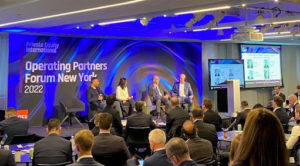What is Customer Retention?
Customer retention measures how well a business maintains its customer base over a specific period. It’s an important metric because it is often more cost-effective to retain existing customers than acquire new ones.
When customers consistently choose your brand over competitors, they bring repeat business, provide valuable feedback and often become brand advocates.
Achieving high customer retention isn’t easy, though. It requires careful strategizing, meticulous execution and continuous improvement. This is where third-party resources can make a significant difference. Partnering with experts or leveraging cutting-edge tools can save you valuable time and resources.
Whether it’s designing an attractive loyalty program, implementing effective CRM systems or refining your customer experience, industry specific service providers have experience and expertise you need.
Let’s dive deeper into customer retention and how it can help your business.

Understanding The Importance Of Customer Retention
Building customer loyalty is a critical element of customer retention. The value it brings to business growth is immense as loyal customers often translate to repeat business and referrals. There are several key factors influencing customer loyalty, including product quality, customer service and overall customer experience.
Effective customer retention strategies play a pivotal role in fostering long-term relationships. They involve an array of initiatives ranging from loyalty programs to personalized customer engagements. Examining successful case studies can provide a insights for companies looking to improve retention.
READ MORE: Voice of Customer Process: Methodologies for Better Service
Implementing Customer Loyalty Programs
Customer loyalty programs are designed to incentivize repeat business. There are different types of loyalty programs, each with its own benefits. For example, a points system might encourage frequent purchases, while a tiered system could inspire larger transactions.
READ MORE: How To Analyze Sales Data: Tools, Examples, KPIs
When designing a customer loyalty program, several key considerations come into play. These include understanding your customers’ preferences, setting clear and achievable rewards and ensuring the overall process is straightforward and accessible. Implementing and managing these programs effectively can have a significant impact on customer retention.
Enhancing The Customer Experience
An outstanding customer experience can turn one-time customers into repeat clients and casual buyers into brand advocates. Employing strategies to consistently deliver exceptional experiences can significantly improve customer loyalty and retention.
Using CRM systems to manage customer relationships can have numerous benefits. They can help track customer interactions, provide personalized service and identify trends in customer behavior. Similarly, leveraging customer lifecycle management can enhance customer retention by delivering targeted engagements at each stage of the customer’s journey.
READ MORE: Understanding Voice of Customer: Metrics, KPIs, Analytics
Loyalty Management and Measurement
Effective management of customer loyalty initiatives is crucial to their success. This includes not only the implementation of the programs but also ongoing performance monitoring. It’s crucial to track key performance indicators (KPIs) like repeat purchase rate, customer lifetime value and churn rate. Interpreting and acting on these metrics, however, may require a certain level of expertise that specialized third-party services can provide.
Successful customer retention strategies are not set in stone, but are rather dynamic and adaptive. Continual refinement based on customer feedback, market trends and business goals is paramount to their sustained effectiveness. The process of monitoring and adjusting your customer retention efforts can be intricate and time-consuming. Expert third-party service providers, well-versed in data analytics and strategy adaptation, can be an essential asset in this journey.
READ MORE: What is the Voice of Customer Survey?
The journey of customer retention, from understanding its importance to implementing effective strategies, is an intricate, ongoing process. Customer loyalty programs, enhanced customer experiences, CRM and lifecycle management are all tools in your arsenal to foster loyalty and long-term relationships.
The value of maximizing customer retention is clear, but the path to achieving it can be riddled with complexity. BluWave is here to bridge the gap.
Our research and operations team is here to connect you with industry-specific, expertly vetted service providers to help you navigate the complexities of customer retention.



















